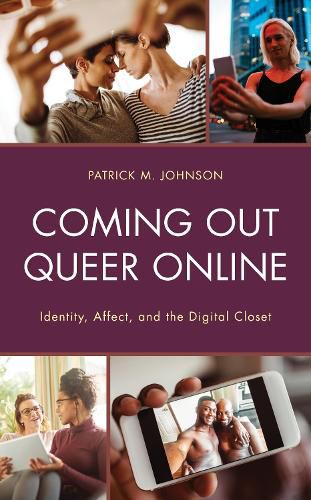Readings Newsletter
Become a Readings Member to make your shopping experience even easier.
Sign in or sign up for free!
You’re not far away from qualifying for FREE standard shipping within Australia
You’ve qualified for FREE standard shipping within Australia
The cart is loading…






The Digital Closet: LGBT*Q Identities and Affective Politics in a Social Media Age discusses how LGBT*Q individuals occupy a precarious space within society as a marginalized community in the United States. They are afforded representation in some venues yet are often invisible. Through social media, LGBT*Q individuals have sought new ways to forge communities and increase their visibility. This rise in visibility afforded individuals means to seek out and distribute information to help in the coming out process. Combining archival research, observation, interviews, and visual discourse analysis of social media feeds, the Patrick Johnson examines the role social media plays in expressions of LGBT*Q politics, culture, and coming out. Despite the messages not having changed fundamentally, the improved access to LGBT*Q stories have amplified the ones that are sent. Johnson argues that this is positive in acting as intervention for LGBT*Q suicide rates, hate crimes, and discrimination from the outside. However, the author also contends that it has vastly re-centered and prioritized white, cisgender, masculinity, obscuring other stories and creating potentially dangerous environments for POC, women, trans* individuals, and gay men who do not meet this high standard of masculinity. Scholars of gender studies, media studies, and queer theory will find this book particularly interesting.
$9.00 standard shipping within Australia
FREE standard shipping within Australia for orders over $100.00
Express & International shipping calculated at checkout
The Digital Closet: LGBT*Q Identities and Affective Politics in a Social Media Age discusses how LGBT*Q individuals occupy a precarious space within society as a marginalized community in the United States. They are afforded representation in some venues yet are often invisible. Through social media, LGBT*Q individuals have sought new ways to forge communities and increase their visibility. This rise in visibility afforded individuals means to seek out and distribute information to help in the coming out process. Combining archival research, observation, interviews, and visual discourse analysis of social media feeds, the Patrick Johnson examines the role social media plays in expressions of LGBT*Q politics, culture, and coming out. Despite the messages not having changed fundamentally, the improved access to LGBT*Q stories have amplified the ones that are sent. Johnson argues that this is positive in acting as intervention for LGBT*Q suicide rates, hate crimes, and discrimination from the outside. However, the author also contends that it has vastly re-centered and prioritized white, cisgender, masculinity, obscuring other stories and creating potentially dangerous environments for POC, women, trans* individuals, and gay men who do not meet this high standard of masculinity. Scholars of gender studies, media studies, and queer theory will find this book particularly interesting.